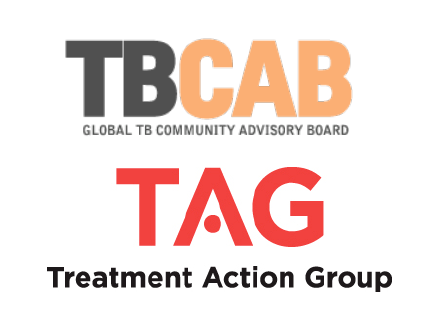
The TB CAB and TAG restate their request to Johns Hopkins University to allow representatives of TB-affected communities to comment on the terms of any agreement with Sequella before it is finalized.
On May 7, 2015 the Global TB Community Advisory Board (TB CAB) and Treatment Action Group (TAG) sent an open letter to Johns Hopkins University urging the institution to include time bound development and access provisions in the agreement licensing the remaining intellectual property for sutezolid to Sequella.
The letter also requested that Johns Hopkins University allow representatives of TB-affected communities to comment on the terms of any agreement with Sequella before it is finalized.
On June 23, 2015 Johns Hopkins responded, specifying that, regarding the rapid development of sutezolid, the institution has strengthened their license provisions to include specific dates for meeting development milestones and that it intends to hold Sequella to that timeline. The letter further states that in order to ensure access provisions for collaborative research, Johns Hopkins has engaged with Medicines Patent Pool to understand the structure of their agreements for use in a sutezolid patent license.
“The university is committed to diligence milestones that obligate our licensee to achieve development and access goals in a reasonable time. Failure to achieve these milestones would require the university, as licensor, to exercise its license rights regarding breach and termination. Likewise, Seguella, with the financial backing of Celgene, is also fully committed to moving sutezolid along the development timeline as quickly as is reasonably possible. Along those lines, it is equally important that Sequella complete the testing necessary to ensure that sutezolid is safe and effective for use as part of a combination therapy for TB before allowing the broad administration of sutezolid to humans.”
The letter also states that Johns Hopkins sought the perspective and feedback of TB-affected communities on the terms of the agreement with Sequella. The following are specified in the letter as TB-affected communities: the TB Association, Doctors without Borders, UAEM and the Gates Foundation.
“This was done in conjunction with Johns Hopkins TB clinician Susan Darman, MD, a professor and leading expert in drug resistant TB with extensive patient and clinical trial experience, as well as Thomas Quinn, MD, who runs the Johns Hopkins Center for Global Health. These comments and suggestions to the license have helped aid in the drafting of a strong agreement for the parties involved.”
The TB CAB and TAG responded by e-mail on July 8, 2015 reiterating their original request for Johns Hopkins University to allow the TB CAB, to review and comment on the terms of any agreement before it is finalized. The TB CAB's concern is that the communities consulted by Johns Hopkins University thus far represent researchers and professional and student organizations engaged in the response to TB and other diseases, but not TB-affected communities themselves.
Here is the email sent by Erica Lessem on behalf of the TB CAB and TAG:
“Dear Mr. Veloso, Ms. Henry, colleagues,
Thank you again for your response. We are pleased to see your acknowledgement of our concerns.
We would like to reiterate, however, our request from our original letter on May 7th to allow our group, the Global TB Community Advisory Board, to review and comment on the terms of any agreement before it is finalized. While it's clear you've solicited input from a range of important and knowledgeable parties, none of these actually represents TB-affected communities themselves, but rather researchers and professional and student organizations engaged in the response to TB and other diseases. We would very much appreciate the opportunity as well to review and comment to ensure the agreement indeed reflects community members' perspectives on research and access for this important drug candidate.
Best,
Erica”